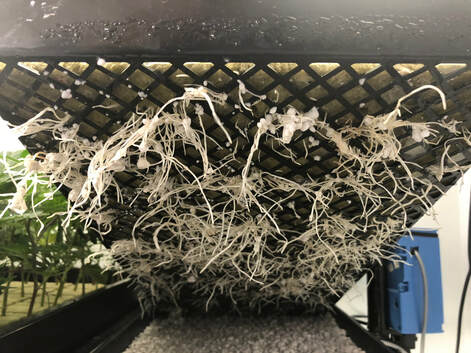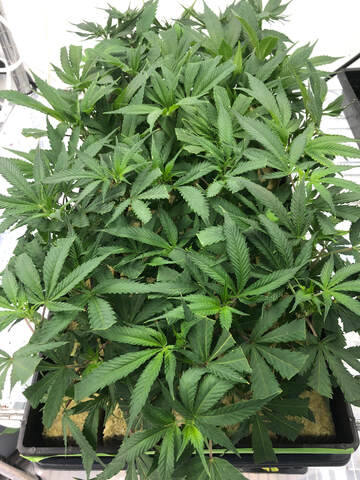Cannabis Tissue Culture Consulting | Cannabis Cloning Consultants
Commercial Cannabis Cloning
In the underground days of cannabis cultivation, only traditional propagation and cloning techniques were used to make baby plants. This involves taking cuttings from mother plants that are kept in stable conditions until they root, which under ideal conditions, takes 7-12 days, and then the roots are allowed to develop for another week before the plant are transferred to the vegetative growth phase. The benefit of using clones vs starting from seeds is that, with clones, you are getting all female plants of a proven genetic type--a cultivar that you already know will be productive and popular. With seeds, you'll spend an extra 3-4 months selecting genetics because of the time it takes to find the keepers and turn them into mother plants.
Traditional cannabis cloning works great for internal plant reproduction purposes, but it's a problem when it comes to acquiring genetics from outside sources. This is because there are many insect infestations and plant diseases that move from one facility to the next via clones. In fact, almost 100% of facilities that acquire clones from outside sources bring in unwanted infections or infestations at some point. Some of these pest problems are so stubborn that once a facility has them, it will have them forever, or until the facility is completely emptied, sanitized and restarted. This applies to problems such as root aphids, broad mites, fusarium, hop latent viroid, and several other less serious issues. Once you have one of these plant pathology problems, you'll be hating life because your yields and quality will go down while your labor cost goes up with foliar and systemic treatments that must be applied. It's no way to live, but there's no easy way out. That's where tissue culture comes in.
Traditional cannabis cloning works great for internal plant reproduction purposes, but it's a problem when it comes to acquiring genetics from outside sources. This is because there are many insect infestations and plant diseases that move from one facility to the next via clones. In fact, almost 100% of facilities that acquire clones from outside sources bring in unwanted infections or infestations at some point. Some of these pest problems are so stubborn that once a facility has them, it will have them forever, or until the facility is completely emptied, sanitized and restarted. This applies to problems such as root aphids, broad mites, fusarium, hop latent viroid, and several other less serious issues. Once you have one of these plant pathology problems, you'll be hating life because your yields and quality will go down while your labor cost goes up with foliar and systemic treatments that must be applied. It's no way to live, but there's no easy way out. That's where tissue culture comes in.
Cannabis Tissue Culture
Plant Tissue Culture, also known as micropropagation, is an advanced method of cannabis clonal plant propagation and offer several advantages over traditional cloning or propagating from seed. Plants in tissue culture are grown in a sterile environment, which comes along with some direct benefits. The plant tissue is washed and dissected prior to being cultured, removing any pathogens and pests living on the plant. The sterile environment ensures that these pathogens do not re-infect the plants in culture, thus a pathogen-free plant is produced.
In addition to enhancing the performance and health of your plants, cannabis tissue culture allows you to maintain your genetic stock in a safer and more economical way. Using tissue culture methods allows you to produce hundreds of baby plants in a small amount of space, rapidly propagating out large numbers of babies from a new cultivar.
Although tissue culture has been around for decades and is widely used for propagation and genetic banking in traditional agriculture, it is a new approach to the cannabis plant and still has some associated limitations for the mass propagation of cannabis. As of now, it is best to pair a small tissue culture lab with traditional cloning in order to grow large numbers of clones to fill a facility. Tissue culture will produce higher quality mother plants that will provide better clones to populated your flower rooms, and these superior mother plants can be replaced frequently from culture to maintain the overall health, cleanliness and vitality of your genetic stock.
Our team has years of experience in both cannabis tissue culture and traditional cloning and we can help you create a better beginning to your supply chain. After all, the baby plants are what the whole production facility is built on! Ask us how we can help you.
Jennifer Martin started her career as a commercial grower California, primarily producing clones using traditional cloning methods. She had a knack for it from the beginning, probably because she like measuring every little thing and getting her conditions and settings just right. Between 1996-2012, Jennifer and her employees produced over 2 million clones for SF Bay Area dispensaries and tried every rooting variation imaginable to find the right lighting, moisture levels (in the media, humidity dome and outside air), temperatures, rockwool soaks, rooting hormones, and cutting methods to zero in on a reliable system for large-scale production. Jennifer prides herself on keeping systems and methods simple and efficient.
Chase Huff has design and operational experience in cannabis tissue culture labs in Colorado and California dating back to 2015. He is familiar with various approaches to cannabis micropropagation, managing dozens of cultivars, differences in media types, SOP development and vendor relationships. Chase is a serious plant scientist, able to focus in on details and zoom out to the big picture of setting up and operating an efficient and effective cannabis tissue culture lab.
Read more about Jennifer and Chase here.
Contact Us for more information and to get started producing thousands of clean cannabis clones per week.
In addition to enhancing the performance and health of your plants, cannabis tissue culture allows you to maintain your genetic stock in a safer and more economical way. Using tissue culture methods allows you to produce hundreds of baby plants in a small amount of space, rapidly propagating out large numbers of babies from a new cultivar.
Although tissue culture has been around for decades and is widely used for propagation and genetic banking in traditional agriculture, it is a new approach to the cannabis plant and still has some associated limitations for the mass propagation of cannabis. As of now, it is best to pair a small tissue culture lab with traditional cloning in order to grow large numbers of clones to fill a facility. Tissue culture will produce higher quality mother plants that will provide better clones to populated your flower rooms, and these superior mother plants can be replaced frequently from culture to maintain the overall health, cleanliness and vitality of your genetic stock.
Our team has years of experience in both cannabis tissue culture and traditional cloning and we can help you create a better beginning to your supply chain. After all, the baby plants are what the whole production facility is built on! Ask us how we can help you.
Jennifer Martin started her career as a commercial grower California, primarily producing clones using traditional cloning methods. She had a knack for it from the beginning, probably because she like measuring every little thing and getting her conditions and settings just right. Between 1996-2012, Jennifer and her employees produced over 2 million clones for SF Bay Area dispensaries and tried every rooting variation imaginable to find the right lighting, moisture levels (in the media, humidity dome and outside air), temperatures, rockwool soaks, rooting hormones, and cutting methods to zero in on a reliable system for large-scale production. Jennifer prides herself on keeping systems and methods simple and efficient.
Chase Huff has design and operational experience in cannabis tissue culture labs in Colorado and California dating back to 2015. He is familiar with various approaches to cannabis micropropagation, managing dozens of cultivars, differences in media types, SOP development and vendor relationships. Chase is a serious plant scientist, able to focus in on details and zoom out to the big picture of setting up and operating an efficient and effective cannabis tissue culture lab.
Read more about Jennifer and Chase here.
Contact Us for more information and to get started producing thousands of clean cannabis clones per week.

